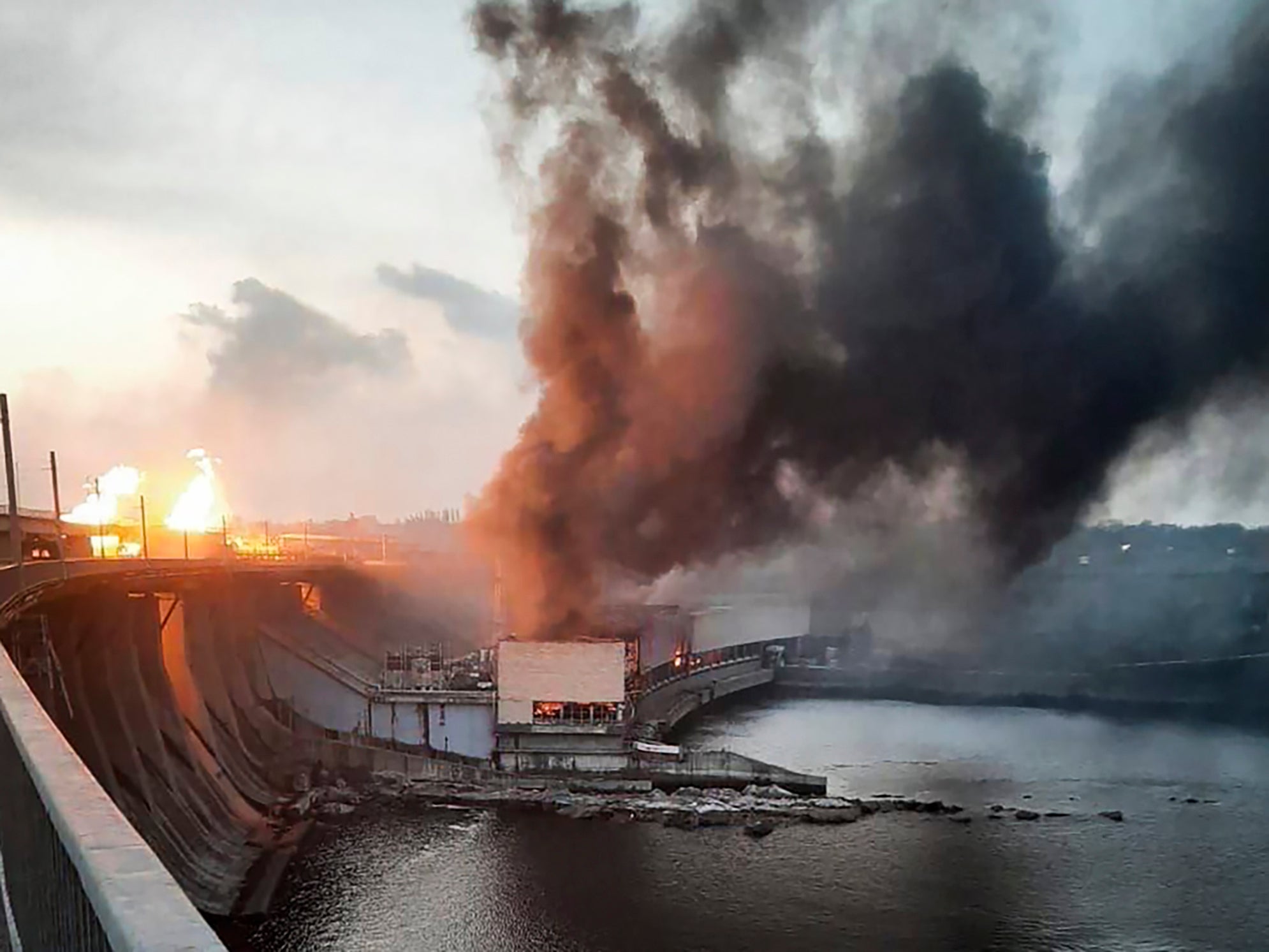Moscow hits vast dam as it launches more than 150 missiles and drones against Ukraine’s energy facilities
It comes as the Kremlin finally admits for the first time that its invasion of Ukraine is a war

Russia has launched its largest attack on Ukrainian energy infrastructure since the war began, Kyiv has said – firing more than 150 missiles and drones, hitting a vast dam over the Dnipro River and killing at least five people.
Dozens of energy facilities across the country were hit in the attacks, plunging more than a million Ukrainian civilians across seven regions into blackouts, as Poland, Romania and Slovakia rushed to supply emergency power.
“The world sees the targets of Russian terrorists as clearly as possible: power plants and energy supply lines, a hydroelectric dam, ordinary residential buildings, even a trolleybus,” wrote Ukrainian president Volodymyr Zelensky on the Telegram messaging platform. “Russia is at war against the ordinary life of people.”
Ukraine’s largest dam, the DniproHES in the southern city of Zaporizhzhia, which supplies electricity to the nearby nuclear plant, was also hit eight times, according to Yuriy Bielousov, head of the war department of the general prosecutor’s office.
The main external power line to the plant was cut off as a result, International Atomic Energy Agency head Rafael Grossi said, though Ukraine’s nuclear energy operator said it was restored several hours later.
Moscow called the strikes “revenge” for deadly cross-border raids earlier this month by pro-Ukrainian military groups and repeated attacks by Kyiv on Russian infrastructure. It is a claim rejected by Andriy Kramarov, a former officer of a Ukrainian anti-missile unit.
“It is very bad that there are discussions suggesting today’s Russian strikes on us are equal to our strikes on their [oil] refineries,” he said. “They don’t even have any people that struggle from these attacks. We have a lot of civilians killed. They are not the same. The idea that the attacks cause casualties of war on both sides is wrong. Today’s attack was another terrorist attack from Russia. We are just trying to strike their economy without any civilian casualties.”
The attack came as the Kremlin described the invasion of Ukraine as a “war” for the first time. For more than two years, Russian officials and state-owned media have used the propagandistic phrase “special military operation” to describe the attack on Ukraine in order to downplay its impact on mainland Russia and its people.
“It started as a special military operation,” said Kremlin spokesperson Dmitry Peskov in an interview with a Russian newspaper, “But as soon as this gang developed and the collective West started participating in the conflict on the side of Ukraine, for us it became a war.”
Mark Galeotti, an expert on Russian strategy, said the adoption of the word war signalled “the Kremlin’s demand that every Russian get into a wartime mindset, and realise there is now no middle ground between being a patriot and a traitor”.
European Commission president Ursula von der Leyen, meanwhile, said the comments proved that the Kremlin betrayed the Russian population for the last two years by hiding the facts and denying that they are at war.
Russia’s Belgorod and Kursk regions bordering Ukraine have been attacked multiple times this month by pro-Kyiv Russian military groups. Belgorod governor Vyacheslav Gladkov said one person had been killed by further Ukrainian strikes in the region on Friday morning. And at least nine oil refineries in western Russia have also been attacked by long-range drones this year.
The overnight long-range assault across Ukrainian territory – at least 12 regions across Ukraine were hit by the onslaught of missiles and drones, fired from land, sea and air. Some 1.2 million people in at least four regions have been left without power due to the attacks on Ukraine, according to figures posted by presidential aide Oleksiy Kuleba. Around 700,000 of those were in the eastern region of Kharkiv alone.
“It was the most significant and well-planned attack on the energy sector since the onset of the war, targeting dozens of energy facilities,” said Oleksandr Kharchenko, director of the Energy Industry Research Center in Kyiv, which advises the Ukrainian government on the energy sector.
He said the scale of the attack indicated extensive preparation time, including the stockpiling of missiles and the gathering of information on the current state of the Ukrainian energy system. Similar attacks were carried out in the winter of 2022, which Mr Kharchenko suggested meant Russians had been studying in preparation for this attack.
“It’s a solid assumption that the planning of this operation involved not only military personnel but also intelligence services and Russian energy specialists,” he said. “Given the nature of the attack, they were well-informed about our defences and attempted to bypass them. Strategic planning was undoubtedly conducted by energy experts, considering the specific targets they aimed to hit.”
Subscribe to Independent Premium to bookmark this article
Want to bookmark your favourite articles and stories to read or reference later? Start your Independent Premium subscription today.

Join our commenting forum
Join thought-provoking conversations, follow other Independent readers and see their replies